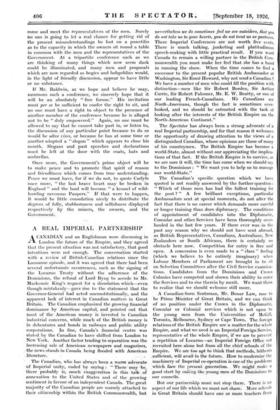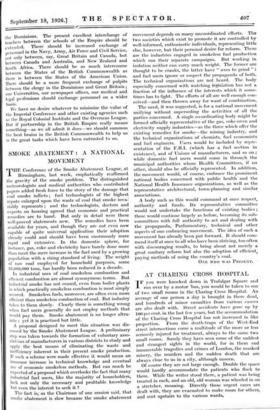A REAL IMPERIAL PARTNERSHIP
ACANADIAN and an Englishman were discussing in London the future of the Empire, and they agreed that the present situation was not satisfactory, that good intentions were not enough. The conversation started with a review of British-Canadian relations since the Lausanne episode, and it was agreed that there had been several unfortunate occurrences, such as the signing of the Locarno Treaty without the adherence of the Dominions, the refusal of Lord Byng to accede to Mr. Mackenzie King's request for a dissolution which—even though mistakenly—gave rise to the statement that the Governor-General had acted unconstitutionally, and the apparent lack of interest in Canadian matters in Great Britain. The Canadian emphasized the growing financial dominance by American capital, and pointed out that most of the American money is invested in Canadian industrial concerns, while much of the British money is in debentures and bonds in railways and public utility corporations. In fine, Canada's financial centre was stated by the Canadian to have shifted from London to New York. Another factor tending to separation was-the increasing sale of American newspapers and magazines, the news-stands in Canada being flooded with American literature.
• The Canadian, who has always been a warm advocate of Imperial unity, ended by saying " There- may be, there- probably is; much' exaggeration • in this- talk of annexation to the United States and of the growing sentiment in favour of an independent Canada. The great majority of the Canadian people are warmly attached to their citizenship within the British Commonwealth, but
•
nevertheless we do sometimes feel we are outsiders, that you do not take us to your hearts, you do not treat us as partners.
These Imperial Conferences are not worth five cents.
There is much talking, junketing and platitudinous speech-making-with little practical result. If you want Canada to remain a willing partner in the British Com- monwealth you must 'make her feel that she has a hand in running the show. When the time comes to find a successor to the present popular British Ambassador at Washington, Sir Esme Howard, why not send-a Canadian ? We have a number of men who could fill the position with distinction—men like Sir Robert Borden, Sir Arthur Currie, Sir Robert Falconer, Mr. E. W. Beatty, or one of our leading French-Canadians. - We Canadians are North-Americans, though the fact is sometimes over- looked, and we should be entrusted with the task of looking after the interests of the British Empire on the North-American Continent."
The Spectator has always been a strong advocate of a real Imperial partnership, and for that reason it welcomes the opportunity of drawing attention to the views of a distinguished Canadian, whose opinions are those of many of his countrymen. The British Empire has become a world-State, almost without our appreciating the implica- tions of that fact. If the British Empire is to survive, as we are sure it will, the time has come when we should say to the Dominions : " We want you to help us to manage our world-State."
The Canadian's specific question which we has quoted is not readily answered by the further question : " Which of those men has had the fullest training for the post ? " A few brilliant exceptions, particular Ambassadors sent at special moments, do not alter the fact that there is no career which demands more careful or longer training than does diplomacy. The conditions of appointment of candidates into the Diplomatic, Consular and other Services have been thoroughly over- hauled in the last few years. If there ever was in the past any reason why we should not have sent abroad, as British Representatives, Canadians, Australians, New Zealanders or South Africans, there is certainly no obstacle here now. Competition for entry is free and open. A concession is even made to a " class " feeling (which we believe to be entirely imaginary) when Labour Members of Parliament are brought in to sit on Selection Committees after the Civil Service examina- tions. Candidates from the Dominions and Crown Colonies have competed and shown their ability to enter the Services and to rise therein by merit. We want them to realize that we should welcome still more.
A Canadian-born Scotsman, Mr. Bonar Law, rose to be Prime Minister of Great Britain, and we can think of no position under the Crown in the Diplomatic, Consular or Colonial services which is not open to the young men from the Universities of McGill, Toronto, Melbourne, Sydney or Cape Town. The foreign relations of the British Empire are a matter for the whole Empire, and what we need is an Imperial Foreign Service, representative of the whole Empire, if we are to prevent a repetition of Locarno—an Imperial Foreign Office not recruited here alone but from all the chief schools of the Empire. We are too apt to think that methods, hitherto -sufficient, will avail in the future.. How to modernize the machinery of Imperial co-operation is- one-of the problems which face the present generation. We might _make a good start by calling the young men of the Dominions to our councils.
But our partnership must not stop there. There is no aspect of our life which we must not share. More schools in Great Britain should have one or more teachers from the Dominions. The present excellent interchange of teachers between the schools of the Empire should be extended. There should be increased exchange of personnel in the Navy, Army, Air Force and Civil Service, not only between, say, Great Britain and Canada, but between Canada and Australia, and New Zealand and South Africa. There should be as much intercourse between the States of the British Commonwealth as there is between the States of the American Union. There should be a more frequent exchange of pulpits between the clergy in the Dominions and Great Britain ; our Universities, our newspaper offices, our medical and legal professions should exchange personnel on a wider basis. , We have no desire whatever to minimize the value of the Imperial Conference and other existing agencies such as the Royal Colonial Institute and the Overseas League. But if partnership in the British Empire really means something—as we all admit it does—we should summon the best brains in the British Commonwealth to help us in the great tasks which have been entrusted to us.































































 Previous page
Previous page